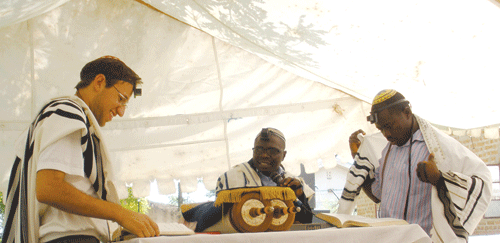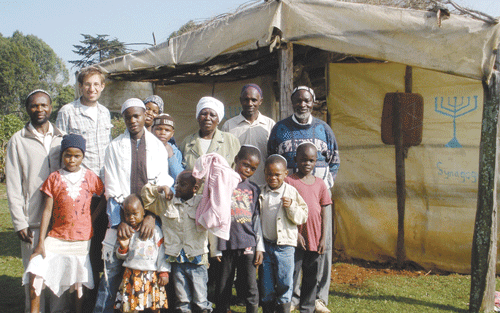Ari Witkin, of Edina, visited Jews halfway around the world and came back with a ‘reinvigorated dedication to Jewish practice’
By ERIN ELLIOTT BRYAN /Â Community News Editor
After Edina native Ari Witkin graduated from Goucher College with degrees in religious studies and peace studies/conflict resolution, he became involved with faith outreach and interfaith work in the Baltimore area. There, he did a one-year AmeriCorps fellowship with the Greater Homewood Community Corporation, where he worked with congregations to build stronger communities; and later he worked with the Baltimore Interfaith Coalition, which incorporated the faith community into violence prevention programs.
But eventually, Witkin wanted a change. He knew he was interested in traveling abroad, so he thought about Israel. But he decided it wasn’t the best fit for him at the time.
“In life, sometimes you have plans and they don’t happen as you expect,” Witkin told the AJW. “I really wanted to be involved in Jewish community, but also take a break from Baltimore and maybe from the States.”
So instead of Israel, he went to Africa — alone.
Witkin had heard of the Abayudaya Jewish community and its Rabbi Gershom Sizomu from Beth El Synagogue’s Rabbi Avi Olitzky, who studied with Sizomu in Jerusalem. Witkin sent Sizomu an e-mail and Sizomu asked him to call. The date was March 8.
“I called him an hour later and he said, ‘So when are you coming?’” Witkin recalled. “I said, ‘Well, I thought maybe we’d have a conversation about what this would look like, what the living situation [would be], what I’d be doing.’ And he said, ‘No, that stuff works itself out, just tell me when you’ll be at the airport and we’ll pick you up.’”
Witkin told Sizomu he’d be there on April 1.
“I sold all my stuff that was too large to fit in a friend’s attic and I got on a plane and went to Uganda,” Witkin said. “And I really didn’t know how long I’d be there.”
Witkin ultimately spent six months traveling throughout southern and eastern Africa, where he visited seven different countries and three different Jewish communities. He returned to Minnesota to spend a week with family over Rosh Hashana.
Witkin arrived in Uganda at the airport in Entebbe, which is located 40 minutes outside of Kampala, the country’s largest city. From Kampala, it was a four-and-a-half hour drive to the city of Mbale, outside of which is the village of Nabugoye, where the Abayudaya community is based.
“The beauty of the place is stunning. It is red earth and green everywhere,” Witkin said. “It’s up on this hill and… it’s just gardens and villages and red dirt roads running through banana groves for miles and miles and miles.”
During his four-month stay with the Abayudaya, Witkin lived in the community’s guest house, which had both running water and electricity “most of the time.” His mornings were spent in a yeshiva class, where he studied Tanach and halacha, as well as elements of community leadership.
Witkin explained that there are six or seven other synagogues around Mbale, and the leaders of those communities study together in Nabugoye. Then on Shabbat and holidays, they lead their own congregations.
“We were learning together, but Rabbi Gershom is really focused on building leaders so that the community can grow and advance,” Witkin said. “It’s definitely still scholarly, but not in the same way that learning here is. It’s more specifically oriented to building leaders.”
In the afternoons, Witkin volunteered at Tobin Medical Center, a health center that the community built several years ago, and served as a community resource, helping out where he could.
“When people said, ‘Can you help me plant corn?’ I helped plant corn. ‘Can you sit and talk?’ or ‘There’s a computer in town, can you help me open an e-mail?’ Basic things like that,” Witkin said. “I didn’t see myself living life different than I would as a member of any other community. Most people there don’t have careers, so not having a job didn’t make me the odd person out, by any means. I was just another person in the village.”
At the end of July, Witkin was invited to visit Kenya by Samson, his roommate from Nabugoye, who grew up in a community of what Witkin described as Messianic Jews.
According to Witkin, once the community encountered the expatriate Jewish community in Nairobi, they sought to abandon the Christian aspects of their practice and convert to Judaism. Rabbi Gershom reached out to the rural Kenyan Jewish community and now educates its children — which eventually brought Samson to Nabugoye.
“Now my journey had kind of switched from Uganda to this search for other communities,” Witkin said. “And traveling in Africa if you’re not wealthy is interesting and difficult and hilarious and sometimes just scary.”
Witkin and his friend Samson paid $12 for a 15-hour, overnight bus ride from Mbale to Nairobi. From there, it was a two-hour drive into Kenya, followed by a 20-minute motorcycle ride and half-mile hike to the synagogue.
“It’s not easy to get to this synagogue, but it was really fantastic to see where my friend Samson had grown up,” Witkin said. “Their community is much smaller and not nearly as advanced in their knowledge or their liturgy, but just as dedicated.”
Witkin spent a few days in Kenya and then visited friends in South Africa. He later traveled to Zimbabwe “on another interesting bus ride” to meet with the Lemba community, who also have a connection with Rabbi Gershom and the Abayudaya community.
“They’re not so much a tribe, but a group of people with a shared ancestral lineage,” Witkin said. “I think there’s about two million Lemba people in the region and they trace their ancestry to Israel before the destruction of the Second Temple, through Yemen.”
Witkin said the Lemba people suffered due to British colonization and development, which built schools run by the church. Today, he said, the community is “kind of complicated.”
“I would say they’re trying to reclaim their Judaism,” Witkin said. “Now you see this Christian people with some sort of weird traditional Jewish practices who are in the face of modernization and with the contact of the outside world, and some internal leadership wanting to reclaim their Judaism. But it’s in the beginning stages, I think.”
After Zimbabwe, Witkin “was just a tourist,” and visited Victoria Falls and Matobo National Park, and Zambia, Zanzibar and Rwanda, among other places, before returning to Uganda. He stayed in Mbale for more than a week before returning to the United States.
“I’m a strong believer in the importance of community… and the way the [Abayudaya] community operated was really beautiful,” Witkin said. “I also have a reinvigorated dedication to Jewish practice, which is most important to me.”
Witkin said it will be an exciting challenge to incorporate what he learned from his experiences in Africa into his life in Baltimore, where he will next work as a program leader with Jewish Funds for Justice. He also wants to be an advocate for the Jewish communities in Africa.
“I feel really blessed to have had the opportunity to be there. I think that, as spiritual seekers, it’s important for all of us to move outside of the comforts of our own box to find out the different places that God exists,” Witkin said. “To know that Shabbat is Shabbat everywhere and that Torah exists with no borders, it’s really wonderful to be a part of that.”
(American Jewish World, 10.14.11)





















Beautiful! We need more of you in the world.